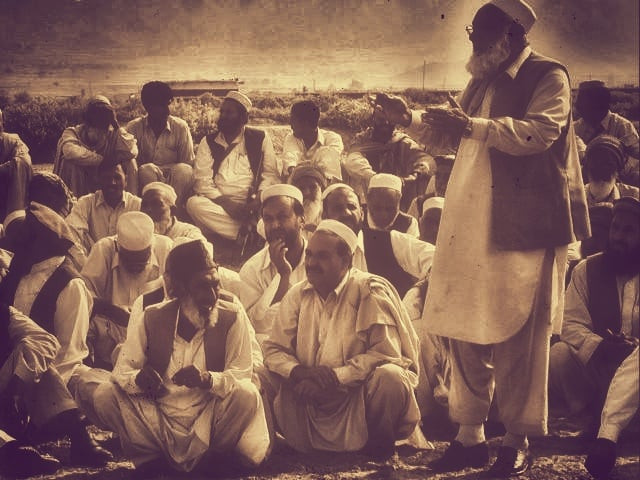“All animals are equal, but some animals are more equal than others.”
That would seem to be somewhat true in light of the recent decisions regarding Nawaz Sharif and Pervez Musharaf. Nevertheless, there is another oft-forgotten system of justice that runs parallel to the mainstream court system: the tribal elders' council of justice. However, this alternative mechanism only comes to the fore when an unfortunate incident like the brutal killing of a woman for sake of honour is sanctioned by a jirga or council of village elders. This is the privatised system of social justice, which thrives in Pakistan and, in particular, the rural localities of Sindh, actively making a mockery of our incumbent legal structure .
During some fieldwork in a district of upper Sindh, I heard many stories about this privatised justice system in action. For instance, one of my key local contacts shared a story from his village where a solar panel valued at Rs6,000 was stolen from a local resident called Dino. When he went to register a complaint at the local police station, they did not register an FIR and instead asked Dino to pay for 'khoji kuttey' (sniffer dogs). They said it was absolutely necessary to arrange for sniffer dogs from one of the local sniffer dog centres for an exuberant price of Rs 20,000. Dino was not convinced at first but the local community insisted that in order to maintain his honour, he must rent the dogs and weed out the culprit. The pressure was such that the poor man ended up selling his cow to rent the dogs. The police showed up with the dogs and their handlers and had a private chat with some of the villagers after which the animals were set free in the village. After a while the dogs entered a house and refused to come out, indicating that the culprit had been found.
The resident of the house, a man named Jurio, was declared to be the thief and the smug looking handlers congratulated Dino and the police for a swift end to what could be a long winded case. Jurio, however, kept proclaiming his innocence and insisted he was framed but no one listened to him. After all he was identified as a thief by a pack of dogs trained by ex-officers of the Pakistan Army and their reliability could not be questioned. The police carried out no further investigations and arrested Jurio on the spot. Much to Jurio's short lived relief, a local sardar intervened on his behalf and arranged the Sindhi variant of a jirgah, a 'faislo' and he was released from police custody. However, Jurio was also found guilty by the jirga and ordered to pay a fine of Rs50,000 to Dino. Ironically what implicated Jurio in the crime were not hard facts but a mere fist fight with Dino in the past.
One would think this sad chain of events ended here but, unfortunately, Jurio himself was a poor man and was now stuck in a conundrum. He had no money to pay the fine and nor could he get out of it, as a sardar had made the decision. So he did what the police had done, lean on someone who could be manipulated, in this case, his wife. Jurio accused her of having an affair with a man from another tribe. He also promptly threw her out of his house and customarily reported the incident to a local 'muqadam' or mediator. The mediator arranged a settlement order issued by some sardars. During the settlement, Jurio's wife was directed to pay half a million rupees to him, out of which half was distributed between the sardars, the mediator, the police and local journalists, all complicit in this crime. Out of the remaining money, Jurio finally settled the Rs50,000 fine, ending the dispute once and for all.
This is not an isolated case with Sindhi newspapers reporting such incidents regularly. Recently, the Daily Pahenji Akhbar, a local Sindhi newspaper reported an incident where a jirga settled an ongoing dispute among three different groups of the Jatoi community. The dispute started over an alleged affair, where the woman's family killed the man over the accusation. The matter intensified and at least four other men, two from each side, were killed with one man sustaining injuries. The matter went to the jirga, which declared the first murder a necessity due to the illicit affair, while it also said that the four other killings nullified each other as both sides had lost two men. A sardar I spoke to said,
“It is our birth right to lead faislo for our community. We know our people better than the government or the courts. Also, the courts take ages to decide a case whereas we can dispense justice locally, quickly and cheaply.”
This is the sad state of affairs of the justice system, where discriminatory and illegal jirgas run unchecked despite an official ban on them in Pakistan. The police and judiciary only take notice of these illegal practices when extreme verdicts given by jirgas jar the general public. Until and unless the existing justice system is reformed and cases are handled within shorter time frames, such illegal parallels will continue to plague our society and dish out botched justice.



COMMENTS
Comments are moderated and generally will be posted if they are on-topic and not abusive.
For more information, please see our Comments FAQ